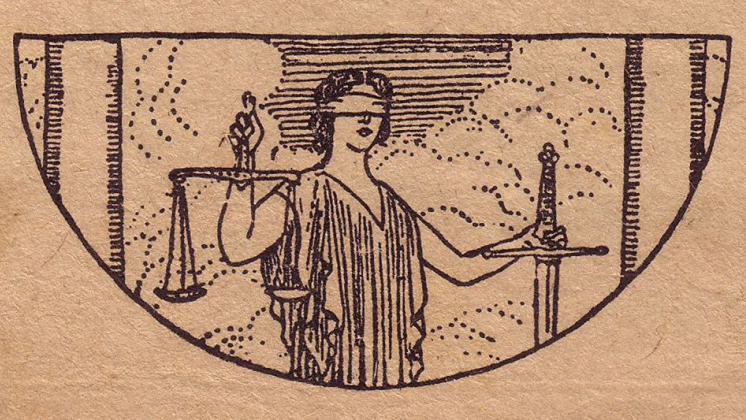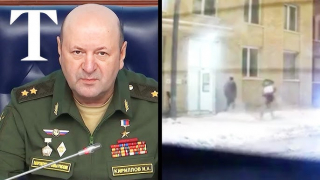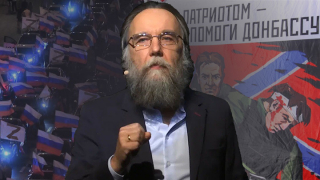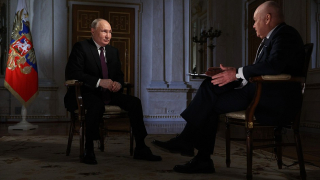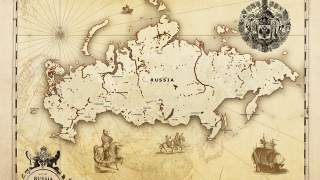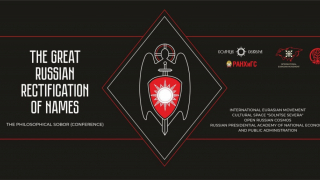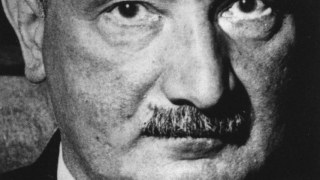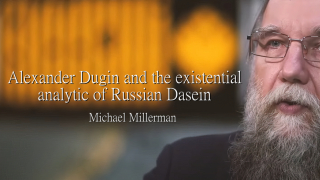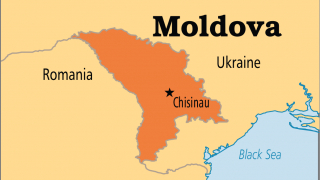Formal and existential law
Carl Schmitt: the decision
The eminent German jurist and philosopher Carl Schmitt developed the concept of the decision in exceptional circumstances. Ernstfall (exceptional circumstances) is when a political decision is made in circumstances that cannot be governed by existing legal rules; in a situation that is not covered by the available law, or if it is, not sufficiently covered; when acting within the law will lead to significant negative consequences. A vivid and recent example can be given. I am very skeptical about the so-called covid-19 outbreak, but the actions taken by many countries (including Russia), more or less inconsistent with existing law (Qr-codes, etc.), represent precisely a decision taken in exceptional circumstances. If covid-19 had represented a real danger at least on a state scale, the example would have been perfectly adequate: political power went beyond legal norms to ensure the safety of society and save lives.
However, Schmitt looked even deeper: a decision in exceptional circumstances presupposes an orientation to tradition, to cultural and mental peculiarities, to the history of the people whose rulers make the decision. A real decision is made when social and legal norms seem to ‘break’ with the everyday flow of ordinary life. Therefore, exceptional circumstances are not just an accident, a catastrophe, but a situation that puts the nation and its political system in a situation that affects its essence, its core, its root. It is natural when legal regulators fail. Where to find the ground for the decision, what to turn to?
Martin Heidegger: consciousness, guilt, determination
In his seminal work Being and Time, Martin Heidegger formulated two concepts: Dasein (being-there) and Das Man (people, the human self). Dasein (being-there) is the central theme of Being and Time and one of the main figures in Heidegger's philosophy in general.
Dasein (being-there) represents the very essence of human nature, literally translated from the German “here-being”. In other words, we can say that the way Dasein (being-there) is, is the actual human being. Dasein (being-there) is the core and root of human nature.
However, Dasein (being-there) has the possibility to exist (exist) in the modus of ownership and in the modus of non-ownership. To put it somewhat simplistically, it can exist (1) fully, authentically, or (2) incompletely, in a kind of falsification, without realizing its potential being in its entirety. The characteristic of the second mode is that it represents the “everyday”, ordinary, habitual being of presence; this is Das Man (man-self).
In his treatise, Heidegger, on the basis of the concept described above, gives the concepts of consciousness and guilt, essentially one through the other, and on their basis the concept of determination.
Thus, nothingness is inherent in the very structure of everyday human existence, because initially man always exists (realizes his existence) in the mode of non-possession (Das Man) - i.e. he loses, he annuls his fundamental essence:
“Presence as everyday being with others turns out to be on the presupposition of others. It is not its own being; others have taken being away from it. The whim of others disposes of the everyday being of presence. This being-with-others completely dissolves its presence every time into the being of others.... We enjoy, have fun as people enjoy; we read, watch and judge literature and art as people watch and judge; but we also turn away from the ‘crowd’ as people turn away; we find outrageous what people find outrageous... The average person is alert to every exception that arises. Every superiority is silently suppressed. Everything that is original is immediately levelled as established. All that is conquered becomes tame. Every mystery loses its power.”
And it is when man realizes that he is in such a state of non-belonging (Das Man) that he truly faces his existential, fundamental, primordial guilt: it is in falling into such a state of “false”, dissipated existence that absolute guilt resides. In a nutshell: man is guilty of losing his original nature. It is only on the basis of this guilt that all other derivations of guilt and guilt as such are possible. However, the vast majority of fallen people in the world cannot and do not want to see this guilt and continue to exist in a scattered and alien everyday life. Thus, the concept of guilt is revealed.
Next, what is conscience? Conscience is the Dasein's call to the self, dissolved in everyday life and people, i.e. the human self. Conscience informs the human self that it is guilty of abandoning its authentic existence (existentia). Conscience is what confronts the human self with its most primal guilt and thus brings it back to its very essence, which it had previously culpably lost.
And what is determination? Almost literally, it is the willingness to ‘throw oneself’ upon one's being-guilty. Put simply, determination must be understood as the will to face one's primal guilt at all costs, however terrible it may seem, to recognize it, to diagnose it, and thus to be able to overcome this state of guilt, to recover one's own, authentic existence.
Raskolnikov: the legislator's crime
One of the elements of Raskolnikov's theory in “Crime and Punishment” is the following thesis:
“All the legislators and institutors of mankind (Lycurgus, Solon, Mohammed, Napoleon) have been criminals, because in establishing a new law they have certainly violated the old law, and in doing so have not stopped before spilling the blood of those innocents who valiantly and honestly fought for the old law. It is even remarkable that most of these benefactors and founders of mankind were particularly terrible blood-shedders.”
Raskolnikov's theory is in no way approved by us. However, anything that has become a theory must necessarily contain elements of truth and correct cause-effect relations, otherwise it could not receive the status of a theory. Meanwhile, Raskolnikov actually developed a theory; this is a fact. Consequently, his conception contains not only tares but also grains. The idea that new laws, in fact, always violate the previous law is precisely a grain that interests us.
Formal Law
Based on the above-mentioned research by Carl Schmitt, Martin Heidegger and F.M. Dostoevsky, let us analyze some approaches to law and jurisprudence that can be outlined from them.
In principle, it is impossible for a solution to be possible within the framework of a valid law. When we use the term “judgement”, the actual meaning is distorted. A judge cannot make a judgement within the limits of the law, nor can anyone else make a judgement within those limits. In passing a so-called “judgement”, a judge must not simply abide by, but be guided entirely by, a certain set of rules that he has not set himself. If the judge goes beyond these rules or misinterprets them, he somehow becomes a transgressor (or even a criminal). Therefore, if we want to convey the true state of affairs, we should say this: guided by the law and observing it, the judge only makes a choice among the possibilities given to him by an external force; only when the judge or someone else goes beyond the boundaries of the law, then he makes a decision.
Hence, developing Schmitt's logic and extending it beyond the political, it must be stated that there is no place for a decision within the framework of everyday jurisprudence, even if something is wrongly labelled with this title. True judgement is inextricably linked to guilt because it transcends everyday law, which brings us back to Heidegger's determination.
However, it is worth noting that, as shown above, Heidegger's determination does not give rise to guilt and is not a guilty act; determination gives the impulse to realize and redeem one's already present guilt, and this guilt consists in betraying oneself. Decision and determination are a way to stop choosing between imposed options and choose one's own; it is a way to move away from the formal law of the fallen everyday and towards the true law of consciousness and being. Guilt in the face of the everyday is transformed into the removal of guilt in the face of oneself.
What follows in the field of jurisprudence and practical legislation? That the law, established by the coming reformers, “criminals” (according to Raskolnikov), decays faster than the current of real life. The call of the people's conscience speaks ever more insistently and loudly of the need, if not to realize itself immediately, at least to move in the direction of authentic existence. This call demands the creation of conditions in which real decisions can be made. Otherwise, law and law become formalized, extinguished, and progressively lose more and more of their connection with the Source, which is always God (though certainly not in the vulgar sense of the US Declaration of Independence, which proclaimed so-called ‘inalienable human rights’ given by God). We can see with the naked eye the results of this switch-off, when the law and the court turn into a contest of lawyers with dirty hands and/or into an instrument for the defence of the group of people in power: every injustice is clothed in a formally correct legal form, and lawyers and other legal practitioners, with varying degrees of literacy, more or less skillfully justify and defend the filth. Punctual reforms within the previous paradigm (even if they seem impressive in terms of volume) cannot radically change anything.
In this respect, the conclusion is that until such an order is established, in which the status of criminals is removed from the “lawgivers and creators of humanity”, or rather the need for them to resort to appropriate methods is removed, the current legal systems cannot be recognized as fully adequate from the point of view of authentic, proper existence. All these systems do not provide reliable tools to look ourselves in the eye, to return to the source of our being through the call of conscience, and to renew crumbling, formalized and empty law in a non-traumatic way.
Moreover, current legal systems are in many ways a direct consequence of the pathological complication of economic and financial relations, which require more and more tools to regulate them. And in this process, the primordial idea of the Law, which once again is available to any person alone, without the mediation of anyone - as long as he or she is confronted with his or her own being and self, as well as a properly organized education of citizens - is increasingly pushed into the background. Plato, in his seminal dialogue The State, wrote thus:
“But tell me, for the love of the gods, do we dare to lay down some law concerning the market place, that is, the transactions that take place there, and, if you like, also the relations between the artisans, the quarrels, the lawsuits, the appointment of judges? And then there is the need to collect and determine taxes... It is not necessary for us to prescribe to those who have received an impeccable education: in most cases they will easily understand what laws are needed here... And if they do not, their whole life will be spent in the fact that they will forever establish many different laws and modify them in the expectation that in this way they will achieve perfection.”
And what, in its essence, is the most perfect education? It is the formation of moral qualities, enabling the fulfilment of divine commandments and awakening the call of conscience, confronting man with his own, authentic being.
We have thus shown that modern law and the law regulate social life within the non-individual and non-authentic existence of the ‘man-self dissolved in the people’. The living root of divine law is increasingly eroded and fragmented. Laws and law are written for lawyers and businessmen. The people are fed rudimentary scraps of law, whose main function is simply to prevent them from chewing each other up. There is no room for judgement.
Existential law. International relations
Heidegger wrote that Dasein (being-there) is one and does not differ from person to person. To a certain extent, at the highest level, this is true - all human beings have the same co-eternal divine nature: God in one human being cannot in its absolute essence differ from God in another human being. But since God in human beings does not embody his absolute, transcendent and immutable essence, but manifests himself in the created, the relative and the finite, these manifestations take on a differentiated and fluid character, like everything in the created world.
We find corresponding differences not only in a single person, but also in more concentrated and generalized forms in peoples (ethnic groups) that have passed through different cultural, historical, religious, etc. paths: “What is good for a Russian is death for a German”.
But it is important to emphasize that all ethnic modifications of authentic existence, even if by different methods, must put the people before their own existence through the appeal of conscience. If this criterion is not met, then the people has “dissolved into the people”. I think it is futile to decipher the meaning of this sad metaphor. Consequently, the authentic legal orders of this or that nation should be built precisely on the conditions of compliance with these criteria, with the provision of instruments to make decisions, and not only in exceptional circumstances: after all, by making a timely decision that goes beyond the formal rules of law, it is possible to make prevention and prevent exceptional circumstances from occurring.
As far as international relations are concerned, it is obvious that the preservation of the possibility of a people's authentic existence should take precedence over the formal rules of international law, especially in their current state, when they resemble something between self-evident notions and instructions for an air freshener. The periodic interpretative meetings and congregations of the EU and G7 make one shudder.
Continuing our reflection in this context, we assert that since 1991 Russia has fallen into a state of non-genuine existence, dissolution and dispersion. The instruments of alien formal law have broken and shattered both the social existence of the people and many individual persons. The gap between the essence of Russian man and the political-legislative environment in which he was placed was truly colossal and tragic, finding expression in two seemingly opposite processes: (1) the total impoverishment and gangsterism of the 1990s, and (2) the total depravity of the so-called ‘affluent’ 00s, with their disgusting culture of middle managers bragging about holiday resort photos, who delight in drinking at company parties, with the “creativity” of the “Leningrad group” and the Comedy Club, who are recognized in Slepakov's song “Every Friday”. In essence, both are facades of the same process: the degradation and splitting of the significant core of the Russian people.
However, the situation itself has developed in such a way as to bring our state ever closer to those exceptional and critical circumstances that require a solution and a face-to-face encounter with one's existence through the appeal of conscience, and thus the application of the norms of existential law. The two points at which the fabric of the everyday existence of our human self is torn apart are 2014 and 2022.
If with the annexation of Crimea in 2014 we simply reminded ourselves of the very existence of a level of existential law, the beginning of a special military operation on 24 February 2022 is a decision. It is a determination, a will to have and to face one's guilt (guilt of the terrible division of the Russian people, of the loss of identity, of territories, of people, of ideas, of the betrayal of one's mentality) and to come out of “being lost in the people”. In Heidegger's own concept - to look directly at one's own death, to realize being-at-death, but this should not be considered a depressive tendency, because the essence of this thought is quite different. Imagine a person who knows that tomorrow he will die, but today he can live as he wishes. This is life in constant remembrance of his or her death, and it is when a person knows with certainty that he or she will live on the last day, that he or she will live this day in the most authentic way - to do the most important thing, without giving up nonsense.
That is precisely the meaning of the beautiful verses:
Do not separate yourself from your loved ones,
Spill all your blood into them.
And each time say goodbye forever!
And each time say goodbye forever!
And every time you say goodbye
When you go away for a moment.
Only the minute-by-minute understanding of one's own mortality removes all superfluous peelings from life, induces one not to put it off until tomorrow, not to argue about anything, not to kill time, to just do something useful.
On 24 February 2022, Russia, through the call of conscience and decision, realized its existential guilt, which must be removed by coming face to face with its existence, with death and realizing its existential right.
It has to be said that our geopolitical adversary acts absolutely authentically for itself, according to all Atlanticist canons, and thus - effectively, even if we observe gaps in its structure, expressed in weak-minded rulers, and this is not unimportant, regardless of which puppets they are. However, having embarked on the path of Decision and, consequently, existential responsibility, we cannot afford to slip into half-measures and methods of non-self-existence, the paradigm of the Continent and the State-Civilization must be maintained from beginning to end. The stakes in the arena of existential justice are too high.
Translation by Costantino Ceoldo

